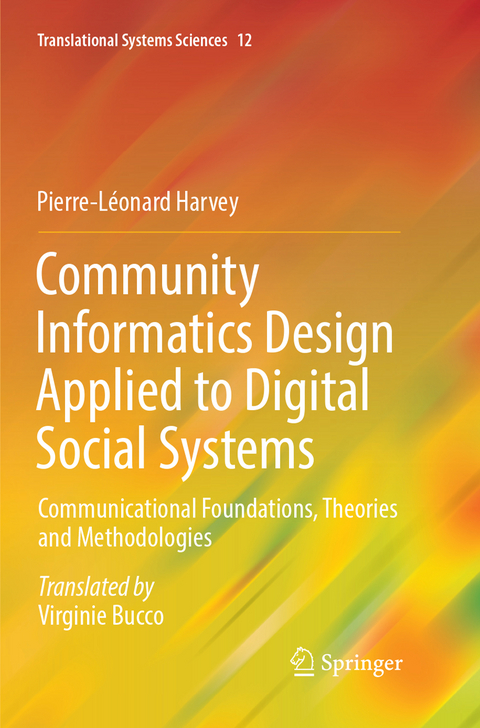
Community Informatics Design Applied to Digital Social Systems
Springer International Publishing (Verlag)
978-3-319-88010-5 (ISBN)
There will be a particular focus on understanding and addressing the dimensions that make people from different communities of practice able to communicate and collaborate through multiple digital media, design platforms, worldviews and modeling approaches.
Pierre-Léonard Harvey studied Communication and Media at University of Ottawa (Bachelor), University of Strasbourg (Master degree) and University of Montreal (Ph.D). He completed his Master's thesis on pedagogy, social psychology and Information and Communication Technology under the direction of Abraham Moles in France in 1981. He also possess a Ph.D degree from the University of Montreal. His 1993 doctoral thesis was on virtual communities modeling and design, social informatics and ICT in the spirit of Rob Kling's socio-technical work. In 1995, he completed further studies on new media and applied communication theory for change in organizational communication. His work on virtual communities applied to e-learning and organization studies in the French speaking worlds are well cited in many peer-reviewed papers and books.In 1993 he became a full professor at University of Quebec in Montreal (UQAM) and in 2000 he founded the Applied Community Informatics Design Laboratory (ACIL) of the Communication Faculty in UQAM. In 2001, he was also a founder and an a research axis coordinator of Hexagram, an Institute for research/Creation in Media Arts and Technologies. In 2009 Harvey was elected as the Director of the Joint Ph.D program in Communication among the university consortium UQAM, Concordia University and University of Montreal. In the Summer of 2010, Prof. Harvey received an invitation to teach and create a first master class course on Design Thinking at the Department Medien Wissenchaft, Bayreuth University, Germany. Since June 2013, he has been an affiliate professor at ÉCHOFAB, an open innovation space and initiative of Communautique Inc., which was the first Canadian Fab Lab to be accredited by MIT in 2011. Since 2015, he has been a research collaborator of The School of Management (ESG UQAM) Ivanhoé Cambridge Real Estate Chair--a research-innovation university chair dedicated to developing knowledge and skills in Real Estate and collaborative spaces--a research collaboration which also includes a role as a scientific coordinator in the Sensorial Design laboratory (D-Sense lab). In 2017, he was elected Scientific Advisor for the Quebec's Digital Governance Institute in Canada, an NPO dedicated to the co-creation of an innovation ecosystem platform for the province of Quebec.He is a researcher/member of the International Network of UNESCO Chairs in Communication (ORBICOM) since 2003.
Introduction.- Part I: The Field Of Community Informatics Design Science: Digital Social Systems' Theoretical Foundations.- Universal Anteriorities and Third Phase Science.- Community Informatics Design's Theoretical Basis.- Community Informatics Design in Action: Towards Operational Ways of Thinking in Order to Start a Design Process.- Generic Communication and Community Informatics Design: Evaluation and Validation of Socio-Technical Design of a Universal Communication Platform, the Informatics Design Assistance System, Using the CAPACITÉS Evaluation Model.- Towards a Scientific Collaborative Design Approach: The Construction of a Community Informatics Design Assistance System to Support Communities and Virtual Organizations.- Part II: From Modeling to Implantation the Reference Framework, Instantiation Methodology and the Discovery and Strategic Alignment Matrices.- Reference Model, Governance Framework, and Instantiation Strategy.- An Instantiation Methodology and its Multiple Aspects.- The Discovery and Strategic Alignment Matrices for Socio-Technical Systems' Design.- The Fields and the Definition Taken Into Account for the Construction of the Multimodal and Multi-Aspect Discovery and Strategic Alignment Matrices (2MDSAM) for the DSS Design.- The Organization and Governance of an Incubation and Learning Environment with the Help of Tool Boxes: Reference Model, Community Informatics Design Framework and Instantiation Methodology.- The Conclusion: Towards a Computerized Modeling Tool for a 2MDSAM with Fully Qualified and Assigned Functionalities.
| Erscheint lt. Verlag | 5.9.2018 |
|---|---|
| Reihe/Serie | Translational Systems Sciences |
| Übersetzer | Virginie Bucco |
| Zusatzinfo | XXX, 459 p. 35 illus., 16 illus. in color. |
| Verlagsort | Cham |
| Sprache | englisch |
| Maße | 155 x 235 mm |
| Gewicht | 747 g |
| Themenwelt | Mathematik / Informatik ► Informatik ► Betriebssysteme / Server |
| Informatik ► Software Entwicklung ► User Interfaces (HCI) | |
| Schlagworte | Applied Community Informatics Labs (ACIL) • building large scale sociotechnical systems • CACIDS • Computer Aided Community Informatics Design System • digital social system praxis framework • DSSPF • Generic Design Science of Social Systems • knowledge production spaces • scientific approach to collaborative design • sharing for social change |
| ISBN-10 | 3-319-88010-1 / 3319880101 |
| ISBN-13 | 978-3-319-88010-5 / 9783319880105 |
| Zustand | Neuware |
| Haben Sie eine Frage zum Produkt? |
aus dem Bereich


